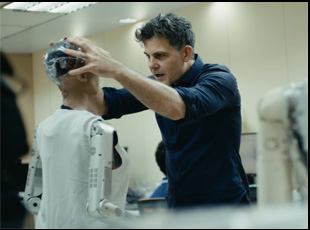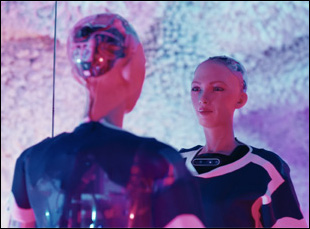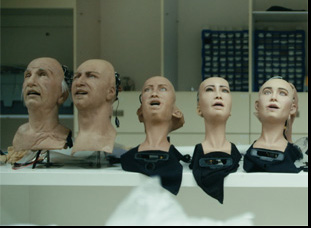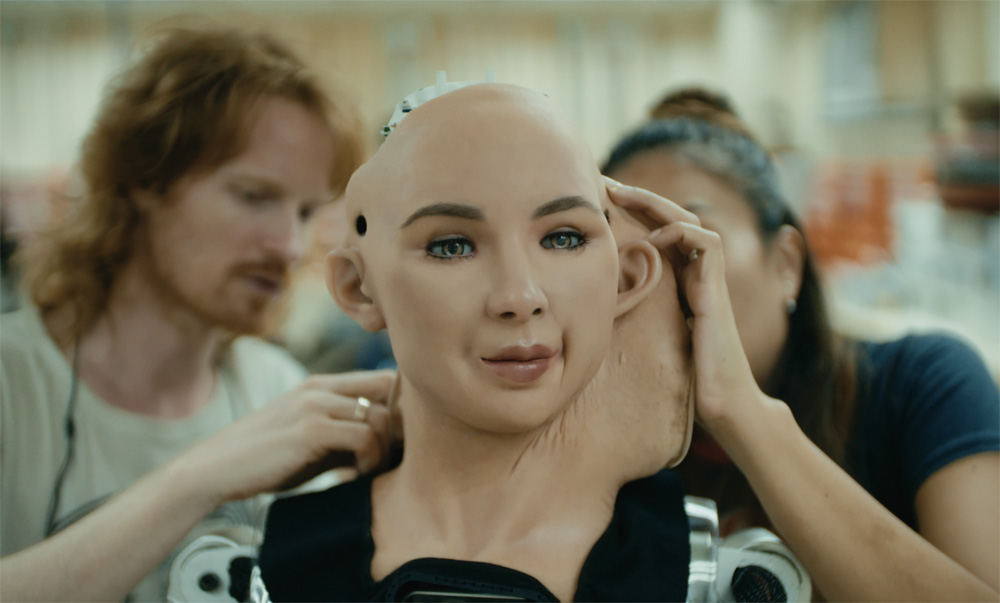Advances in artificial intelligence may have had many flocking to ChatGPT and Gemini in search of answers, but Crystal Moselle and Jon Kasbe were intrigued by the questions it raised with the 2016 introduction of a robot named Sophia that was instilled with a healthy amount of curiosity by her creator Hanson Robotics. Their interest in the largely inanimate object would surely confound any AI trying to offer a simple summary when the filmmakers are both known to embed in vibrant communities and capture life unfolding in front of their lens, whether it’s Moselle’s New York-based “Skate Kitchen” or “The Black Sea” made with her partner Derrick B. Harden or Kasbe’s Kenya-set “When Lambs Become Lions.” Filming in sterile creative laboratories as a robotics team tinkered with Sophia’s programming wouldn’t seem to be worth their attention, but Moselle and Kasbe find that behind the robot is an incredibly human story of its creator, the company founder David Hanson, who works hard to imbue the robot with personality, inevitably leaving traces of his own in its hardware, and hustles to keep financing flowing for his dream, ultimately relocating his business to Hong Kong when interest wanes in the States as development drags out.
“My Robot Sophia” watches Hanson struggle to hold the operation together as the public rollout of Sophia gets underway with talk show appearances and big public presentations, but reveals that he’s driven by forging connections when his own relationship to robots has been a saving grace after losing his father at a young age and beyond throwing himself into his work, he found developing the social skills of his robots actually helped him with his own. When Sophia can only progress as far as Hanson and his team, including his mother who is tasked with creating the skin for the robot over countless prototypes, can take her, the film shows AI as perhaps opening up a world of possibilities, it is ultimately a reflection of human priorities, quirks and deficiencies that’s true value to a society might end up being able to answer more profound questions about who we are than anyone would think to ask themselves.
Slightly ahead of the curve upon premiering at Tribeca in 2022, “My Robot Sophia” arrives now when it can be more greatly appreciated as AI has become more integrated more broadly into everyday life, a timely release inadvertently aided by the unfortunate corporate shutdown of its producer Showtime’s once formidable documentary division, and now as it gets its day in the sun on VOD and digital, Moselle and Kasbe graciously took the time to talk about how they came to collaborate on the film, presenting a more ambivalent view of AI than most on the controversial technology and what makes a strong documentary subject.

How did the two of you join forces on this?
Crystal Moselle: Many years ago, Jon and I worked on this project in Haiti, and he had to leave and when we were done, it was like a short film situation, [and I didn’t hear from him] until he made that film in Kenya [“When Lambs Become Lions”], but I was like, “Oh my gosh, he’s so talented. He’s such a good vibe” and I had seen Sophia online and there was something that really intrigued me about her. In the video, instead of just like what you think of as what a robot does, which is give you information, she was asking the human questions like, “What is it like to feel alive? or “What is sadness?”
I was so intrigued by this different perspective of a robot like, so I hit up [the company] on their website, like filling out the [general contact] form with “Hi, I’m interested in talking to you guys.” They got back to me right away and I had a great conversation with David [where] the first thing he said was, “I’m an artist. I’m interested in consciousness.” I was just wasn’t expecting that. So I called up John [and said], “I’m making this TV show [“Betty”], but I think that there’s this really cool film out in Hong Kong and I have some development money. Do you want to go figure it out?” He’s one of the only people that I could do that with, besides Derrick [B. Harden, my partner].
Jon Kasbe: And I was so thrilled to get the call from Crystal. We’ve become good friends and I think Crystal’s ability to identify characters that just break through is unlike anyone else. Immediately, we start talking and watching YouTube videos about Sophia and a few weeks later, I was on a plane to Hong Kong to go meet David, her creator. Most of what I had to work off of was what I’d seen on the internet, which was Sophia living this glamorous AI celebrity life where she’s on Jimmy Fallon and Will Smith is taking her on a date. I got there [to Hong Kong to meet her] and it was like David Hanson and his mom in a garage, moving these huge buckets of flubber and arguing, but also really collaborating deeply as to where the eyebrows should be and the positioning of the nose, all these like micro details.
I [realized], this is not some huge corporation that has all this money. These are artists in their garage, literally trying to figure this out and I called Crystal [and said], “This is incredible. This is not at all what I thought it would be. These people really care about what they’re doing” and their reasons for doing it was something I didn’t totally understand at first. They’re coming at it from this perspective that empathetic robots are crucial to to our existence and that it’s not a question if AI is going to integrate with our lives or not. It’s more about when and how and they were really focused on figuring out a way to almost train humans to learn how to empathize with and learn how to show compassion to machines.
Now that I’ve seen it, the film looks like a great fusion for you both as filmmakers, but you like to be out and about and this seems like a stationary subject. Was it easy to find your way into the story?
Jon Kasbe: Yeah, both Crystal and I are pretty character-driven in terms of our storytelling. I’m not the type of storyteller who can mentally look at a situation to understand the scope and the plot, so [I always look for] is there a character I connect with and does that person challenge my preconceived notions? Are they someone I want to spend time with? Are they someone that is telling me stories that I have this urge to share with other people? Right off the bat, David and Sophia were hitting that for us. David was wearing all of his emotions on his sleeves. He felt vulnerable, but he also felt like this creative genius and he also felt like he was his own worst enemy, so [I thought], I don’t know what’s going to happen here, but I want to be around him more. Then just from a couple weeks of shooting, it was very clear things are constantly happening in this person’s life. He’s constantly up against [obstacles] and constantly finding ways to overcome them He always feels like he’s on the verge of everything falling apart, but then he also always figures out this miraculous way to save the day at the last minute.
As storytellers, that’s the dream. I have this belief that there’s two types of people in the world — people that have things happen to them and people who don’t — and I think there’s control over that. You attract certain things to you. And David is someone who is 100 percent coming from love. He attracts a lot of chaos and it’s part of what makes the genius of his whole operation work is because of what he attracts, but it doesn’t make it easy by any means.
Crystal Moselle: Yeah, [it’s easy] when you when you meet somebody as a subject and they’re willing to just be truthful with you — and David is the type where he doesn’t know how to not be truthful. Everything is out there and and his relationship with his mother was so endearing and the way that he takes care of his kid and his wife. It just felt like there’s a lot to explore and he was willing to let us explore it. He understands story because he’s telling a story with his robot and we wanted to tell the story of somebody who’s working in AI and robotics that essentially wants to do good for the world. That is Is a story that nobody’s really telling right now and we need it, so it’s it’s a good time for the story as well.
 There’s a scene in the film where you see a video of David from early on in his life, play acting having electroshock therapy on himself that comes at a crucial moment in the film. It’’s a really revealing moment in the film as much for what it illustrates in the scene as the fact that it was handed over to be a part of the film. What was it like to lay your hands on something like that?
There’s a scene in the film where you see a video of David from early on in his life, play acting having electroshock therapy on himself that comes at a crucial moment in the film. It’’s a really revealing moment in the film as much for what it illustrates in the scene as the fact that it was handed over to be a part of the film. What was it like to lay your hands on something like that?
Crystal Moselle: Yeah, we were so lucky to be given that. He handed over all of his archives to us and it felt like “The Wolfpack” years. They handed me 20 tapes and you go through all of it and then it’s just like, filmmaking is such a beautiful process because you’re creating these connections between all these different stories and images.
Jon Kasbe: He had a lot of archive from his student years where he’d made all types of short films and it was really interesting going through all that material because there was this common thread through all of it. Oftentimes, the storyline in these shorts he was making [involved] this type of creative genius scientist who was being constrained or tortured by these corporate entities. This is stuff [he’s making] in his teens and early twenties [where he] has this feeling inside of him that he’s trying to creatively get out. We were watching this material and looking at his life now and it was spooky how similar it was because it’s like you’re in the exact same situation now and you are this special creative force, but you are surrounded both within your company and outside of it with these corporate mindsets that do not fully understand you who are. [They are supportive, but] not totally your friends who are who have other interests that are not your interests that you are battling and negotiating with and wrestling with constantly. It brought up for us this larger question around who we become and the paths we choose and where that’s where that’s coming from? It goes back to what you attract and I think there’s something going on there with David where it’s almost like he needs someone not believing in him to prove them wrong as this driving fuel for him.
 Was there anything that happened that changed your ideas of what this was?
Was there anything that happened that changed your ideas of what this was?
Jon Kasbe: It’s constantly evolving. Crystal and I are both filmmakers who don’t go into stories knowing what it is, and I think that’s important to us to not have the answers at the beginning. My favorite types of movies are the ones where you can feel the filmmakers changing throughout the course of making it and then the audience getting the privilege to go through that experience themselves. We didn’t we didn’t know where David and Sophia’s journey was going to end or how the world was going to be interacting with AI [now] when we started this in 2017. Companies weren’t throwing AI departments on their Web sites because it was important to have. It was a very different landscape. AI was not this household word that everyone was talking about and had access to. It was something people thought about when they thought about sci-fi. Now, people are both terrified and excited.
Crystal Moselle: I remember there was a certain point where [we wondered] what is the ending of this movie? And John would be like, “I feel like [David’s] gonna lose his company or this or that” and I thought, “What are you what are you talking about? This man that goes to the edge of chaos and then pulls back —he’s so good at almost losing it all and then gaining so much. Something magical [always] happens in his life.” And that’s what happened and that’s what I love about David is that he goes really hard in every direction, and that’s what makes a good character.
Jon Kasbe: Yeah, we’re just excited for people to see it now. I think the film was a little bit ahead of its time when it came out [at Tribeca] and when we when we were pitching this around at the beginning, there was this question that kept coming up around like is AI good or bad? I think that’s something that people are still wrestling with and this film taught us that it’s not about if AI is good or bad. It’s about what are what are our intentions as humans? That’s what it comes down to because AI is similar to religion. It can be used for great things in the right hands, but it can also be used for destruction and a lot of pain in the wrong hands, so my hope is that the film and Sophia and this experience is really a reflection on humanity and gives people a chance to think about how they want to use this technology and what their goals are.
“My Robot Sophia” will be available on VOD and digital on May 6th, including on AppleTV and Prime Video.




